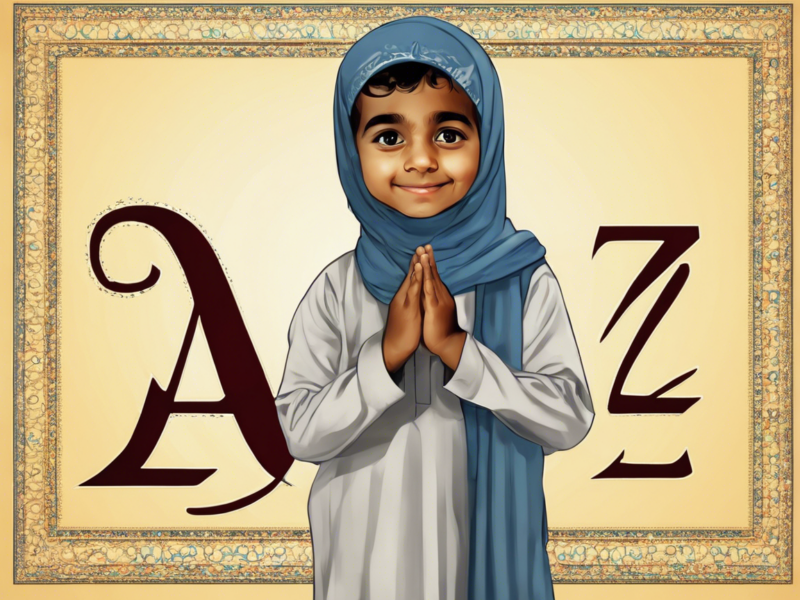Choosing a name for your baby is a momentous decision for any parent. For Muslim parents, selecting a name for their son is not just about aesthetics but also about meaning, tradition, and spirituality. In Islam, the significance of a name is paramount as it is believed to influence the character and destiny of the person throughout their life. Hence, many Muslim parents seek names that carry a positive and profound message, often derived from the Quran, the sayings of Prophet Muhammad (Hadith), or Islamic history and culture.
In this comprehensive guide, we have compiled a list of Muslim boy names from A to Z that are full of meaning and tradition, along with their origins and significance. These names are not only aesthetically pleasing but also hold deep spiritual and historical connotations that can inspire and bless your son’s life.
A
1. Aariz
Origin: Arabic
Meaning: “Respected” or “Brave”
2. Adam
Origin: Arabic
Meaning: “Man” or “Human Being”. In Islamic tradition, Adam is considered the first Prophet and the father of mankind.
B
3. Bilal
Origin: Arabic
Meaning: “Moist” or “Fresh”. Bilal ibn Rabah was a loyal companion of Prophet Muhammad and the first person to perform the call to prayer (Adhan).
4. Bashir
Origin: Arabic
Meaning: “Bringer of good news” or “Harbinger”
C
5. Cemal
Origin: Arabic
Meaning: “Beauty” or “Grace”
D
6. Daud
Origin: Arabic
Meaning: “Beloved” or “Friend of God”. Prophet Dawud (David) is a revered figure in Islam.
E
7. Eesa
Origin: Arabic
Meaning: The Islamic name for Jesus, who is considered a prophet in Islam.
F
8. Faris
Origin: Arabic
Meaning: “Knight” or “Horseman”
G
9. Ghani
Origin: Arabic
Meaning: “Rich” or “Wealthy”
H
10. Haris
Origin: Arabic
Meaning: “Guardian” or “Protector”
11. Hasan
Origin: Arabic
Meaning: “Handsome” or “Good”. Hasan and Husayn, the grandsons of Prophet Muhammad, are revered figures in Islam.
I
12. Ibrahim
Origin: Arabic
Meaning: The Islamic name for Abraham, a prominent prophet in Islam.
J
13. Jamil
Origin: Arabic
Meaning: “Beautiful” or “Graceful”
14. Junaid
Origin: Arabic
Meaning: “Soldier” or “Warrior”
K
15. Khalil
Origin: Arabic
Meaning: “Friend” or “Companion”. Khalil Gibran, the renowned Lebanese-American poet, is a famous bearer of this name.
L
16. Luqman
Origin: Arabic
Meaning: A wise and pious figure mentioned in the Quran.
M
17. Mohammed
Origin: Arabic
Meaning: “Praiseworthy” or “Glorified”. Mohammed is the most common name in the Muslim world, symbolizing the importance of the Prophet Muhammad.
N
18. Nasir
Origin: Arabic
Meaning: “Supporter” or “Defender”
O
19. Omar
Origin: Arabic
Meaning: “Flourishing” or “Long-lived”. Caliph Omar ibn al-Khattab was a prominent early Islamic leader.
P
20. Parvez
Origin: Persian
Meaning: “Victorious” or “Successful”
Q
21. Qasim
Origin: Arabic
Meaning: “Divider” or “Distributor”. Qasim ibn Muhammad was the Prophet Muhammad’s son.
R
22. Rashid
Origin: Arabic
Meaning: “Guided” or “Rightly Guided”
S
23. Sami
Origin: Arabic
Meaning: “Elevated” or “High”
24. Salman
Origin: Arabic
Meaning: “Secure” or “Safe”. Salman al-Farsi was a Persian companion of the Prophet Muhammad.
T
25. Tariq
Origin: Arabic
Meaning: “Morning Star” or “He who knocks at the door”
U
26. Usman
Origin: Arabic
Meaning: “Baby Bustard” or “One who busts the lion”.
V
27. Vaseem
Origin: Arabic
Meaning: “Handsome” or “Beautiful”
W
28. Waleed
Origin: Arabic
Meaning: “Newborn Child” or “New Life”
Y
29. Yusuf
Origin: Arabic
Meaning: The Islamic name for Joseph, a prophet mentioned in the Quran.
Z
30. Zayd
Origin: Arabic
Meaning: “Abundance” or “Growth”. Zayd ibn Haritha was an adopted son of Prophet Muhammad.
By selecting a name with a profound meaning, Muslim parents hope to imbue their son with qualities such as strength, wisdom, piety, or beauty. These names not only honor Islamic tradition but also serve as a constant reminder of the values and principles that parents wish to instill in their children.
Frequently Asked Questions (FAQs)
1. What are some common Arabic names for Muslim boys?
Some common Arabic names for Muslim boys include Mohammed, Ahmed, Ali, Omar, Hassan, Ibrahim, Yusuf, Amin, Bilal, and Malik.
2. Can I choose a non-Arabic name for my Muslim son?
Yes, you can choose a non-Arabic name for your Muslim son as long as the name has a positive meaning and is not associated with any negative connotations in Islam.
3. Are there any names specifically recommended in Islam for boys?
Names of Prophets and righteous figures in Islam are highly recommended, such as Muhammad, Ibrahim, Isma’il, Yusuf, Musa, Harun, Dawud, Sulaiman, Ayyub, and Yahya.
4. Is there a significance to the order of alphabets in choosing a name for a Muslim child?
In some cultures, the order of alphabets may be considered auspicious, but it is not a strict Islamic requirement. The most important aspect is the meaning and appropriateness of the name.
5. Can I combine two names to create a unique name for my child?
Yes, combining two names to create a unique name is common in Muslim cultures. For example, Muhammad Ali is a popular combination of names. Just ensure that the combined name has a positive meaning and is culturally appropriate.
Choosing a name for your newborn son is a special and cherished moment, and by selecting a name rich in meaning and tradition, you can bestow upon him a powerful identity that reflects the values and beliefs you hold dear. Each of the names listed here carries a legacy of faith, valor, wisdom, or beauty, representing the diverse tapestry of Islamic culture and history.

